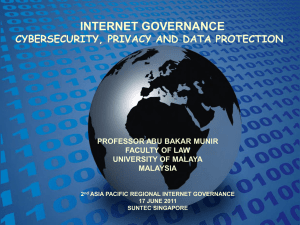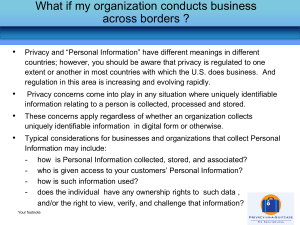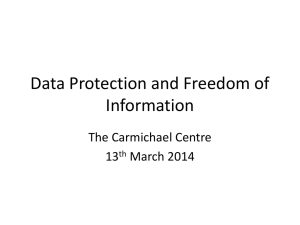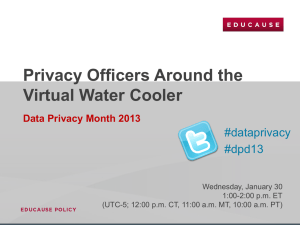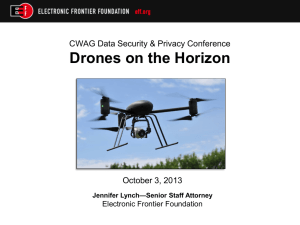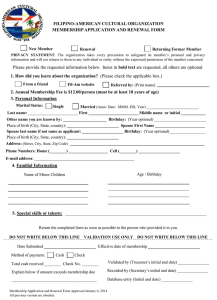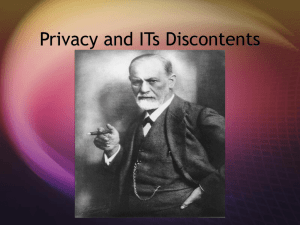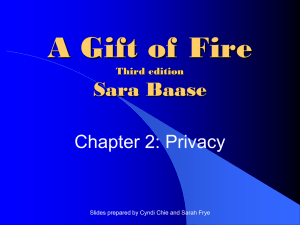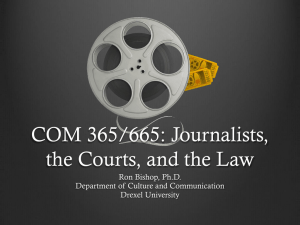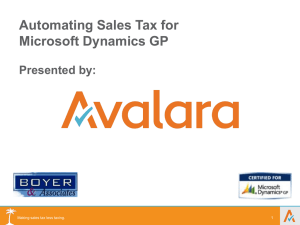Some Aspects of Cyberlaw Related to B2B Marketing
advertisement
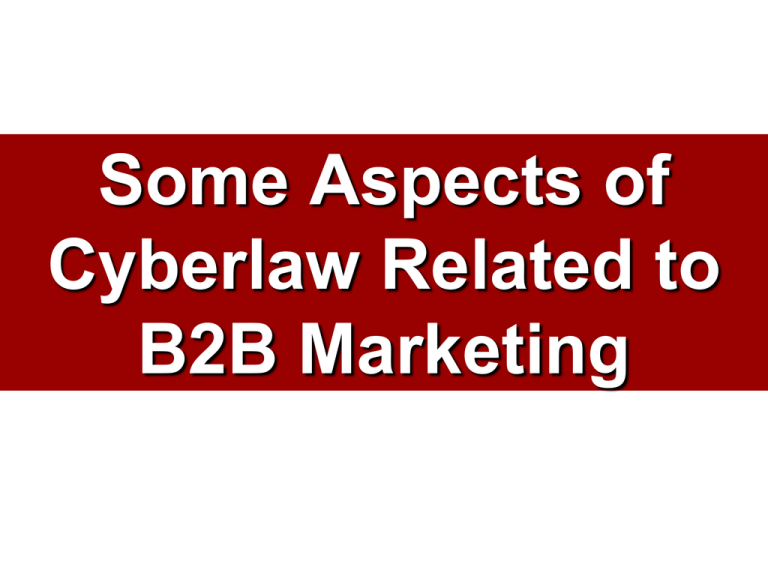
Some Aspects of Cyberlaw Related to B2B Marketing Jurisdiction • The authority of a court of hear a case and resolve a dispute. • Personal Jurisdiction is the court’s authority and power to make the defendant obey a court order. Suits Against Online Firms • Try for the “home court advantage.” – Litigation occurs where defendant’s primary business is located, rather than in the plaintiff’s home state or country. • With U.S.-based firms, this usually means the suit is litigated in federal court, rather than state court. Why the Home Court Advantage is Important • Local law will apply. • Defendant’s attorneys normally don’t have to travel to another jurisdiction for depositions and other kinds of discovery. • Jury is more likely to be familiar with and sympathetic to the e-business. • Lawyer should be familiar with the local judges and their decisions. State “Long-Arm” Statutes • Authorize state courts to claim personal jurisdiction over a nonresident defendant. • Varies from state to state. • Limited by the 5th and 14th Amendments to the United States Constitution. (Due Process) • Under Due Process, for a court to exert personal jurisdiction over a non-resident: – The defendant must have sufficient minimum contacts in the state. – Exerting jurisdiction will not offend traditional notions of fair play and substantial justice. Passive vs. Interactive Web Sites • Passive – Only provides information – Does not solicit business – Is not usually subject to personal jurisdiction in a foreign country or state • Interactive – Provides information for users to make purchasing decisions. – Actively solicits business – May be subject to personal jurisdiction in a foreign country or state Domain Names • Merely a business address on the Internet • Registered with either Network Solutions (NSI) or Internet Corporation for Assigned Names and Numbers (ICANN) Key Difference Between Trademarks & Domain Names • Trademarks – Different companies can use the same trademark for different classes of goods and services • Delta Airlines and Delta Dental. • Domain Names – Only ONE company can register a particular dot.com domain name • jsu.edu Do Domain Names Violate Trademark Laws? • No. – If the domain name user has registered the name with NSI or ICANN • Yes. – If the trademark owner has also registered the name as it’s domain name with NSI/ICANN and registered the domain name with the U.S. Patent & Trademark Office (PTO). Burden of Proof & Defenses in Trademark Infringement • PLAINTIFF – Must prove it owns the trademark – The mark is distinctive and famous – Defendant’s use is causing dilution • DEFENSES – Ownership of a registered trademark – Fair use of the mark in promoting its goods or identifying competing goods – Noncommercial use of the mark – Any form of news reporting or commentary Defining the Terms • Trademark Dilution – Trademark is used by another company in such a manner as to cause its identity to diminish over time. • Dilution by Tarnishment – Mark has been associated by defendant’s conduct with unwholesome, unsavory, or shoddy quality products. – Hasbro sued The Internet Entertainment Group for using its registered trademark “Candyland” as a domain name for a pornography site. Defining the Terms • Dilution by Blurring – Value of a famous trademark is diminished over time by its use on dissimilar products – Toys R Us sued Richard Feinburg. Domain name of gunsareus.com was held to NOT dilute by blurring. Copyrights • An original work of authorship. • Copyright Act of 1976 (Lanham Act) – Amended by the Sonny Bono Copyright Term Extension Act (CETA) in 1998. – Works created prior to 1/1/78 – copyright endures for 28 years with option to renew for another 67. – If created after 1/1/78 – copyright endures for life of the author plus another 70 beyond the author’s death. What Can Be Copyrighted? • • • • • • • • Literary works Musical works Dramatic works Pantomimes/choreographi c works Pictorial, graphic and sculptural works Motion pictures & audiovisual works Sound recordings Architectural works Exclusive Statutory Rights of a Copyright Owner • To reproduce the copyrighted work. • To sell, rent, lease, or otherwise distribute copies of the work to the public • To prepare derivative works based on the copyrighted work • To perform and display publicly the copyrighted work Copyright Infringement • Direct Infringement – Direct actor who, with/without a specific intent to infringe, is primary party that violates one of the copyright owner’s exclusive statutory rights. • Contributory Infringement – Tort (civil wrong not based on contract) of contributing to direct infringement of another. • Vicarious Infringement – Party receives direct financial benefit from the infringement by another party and had right and ability to supervise infringement activity. Limits on Exclusive Rights • Fair Use Doctrine – Purpose and character of the use • Commercial vs. educational use – Nature of the material • Merely informational or factual? – Amount of the copyrighted material used • Just a page or two vs. the whole thing – Impact of use on potential market value Limits on Exclusive Rights • First Sale Doctrine – Exclusive rights end when purchased by another. – Sale of used text books vs. sale of a licensed computer program • Public Domain – All works of the U.S. Government – Works whose copyright term has expired Taxation • Sales tax – A tax paid by the customer at the point of purchase on tangible personal property and is collected by the seller/vendor. – 6600 state and local jurisdictions impose sales and use taxes • Use tax – A tax imposed on the customer for tangible goods purchased out of state for use within the taxing state. When States Can Tax ECommerce • State must have tax jurisdiction over the out-of-state merchant. • For there to be tax jurisdiction, the company must have a physical presence in the state • This is called a Substantial Nexus Commerce Clause Test for Tax Purposes • E-business needs a substantial nexus with the taxing state • The tax must be fairly apportioned • The tax cannot discriminate • The tax must be fairly related to the services provided by the state Physical Presence Nexus Test for E-Commerce • • • • • • • Renting an office or warehouse Holding trade shows Using a Web Merchant’s server Maintaining inventory in a taxing state Licensing software to licensees in a taxing state Hiring agents in a taxing state Falling under the market maintenance theory – Vendor’s state activities are significantly associated with the taxpayer’s ability to establish and maintain a market in the state for its sales. Internet Tax Freedom Act of 1998 (ITFA) • Prevents federal, state and local governments from imposing any new taxes on the Internet for a period of 3 years. • Existing Internet taxes may continue to be imposed on Internet transactions. • Advisory Commission on Electronic Commerce recommended to Congress that the ITFA be extended until 2006 (which it did). • Now has been extended until 2014 Privacy, Obscenity, & Defamation on the Net Privacy • No express or enumerated right to privacy in the Constitution • Do have an implied or penumbral right to privacy under the constitution • 4th, 5th & 9th Amendments 9th Amendment • “The enumeration in this constitution of certain rights shall not be construed to deny or disparage others retained by the people.” • Weak implication of privacy. 4th Amendment • “The right of the people • to be secure in their persons, houses, papers, and effects, • against unreasonable searches and seizures, • shall not be violated; and • no Warrants shall issue, but • upon probable cause, • supported by oath or affirmation, and • particularly describing the place to be searched, and • the persons or things to be seized.” 4th Amendment Creates a “Zone of Privacy” • Establishes a “reasonable expectation of privacy” • Minimum requirements for a reasonable expectation of privacy: – A person exhibits an actual expectation of privacy. – Society recognizes the expectation as reasonable. 5th Amendment • “No person … shall be compelled, in any criminal case, to be a witness against himself.” • Doe vs. United States, 487 U.S. 201 (1988) – With a valid search warrant, law enforcement agencies can obtain an encrypted file, but – The defendant cannot be forced to supply the private key, password, or code that enables decryption or decoding (and thereby, access). Common Law Torts for Invasion of Privacy • Torts recognized as common laws, and • By the Restatement (Second) of Torts. – Intrusion upon Seclusion – Public Disclosure of Private Facts Causing Injury to Reputation – Publicly Placing Another in a False Light – Misappropriation of a Person’s Name or Likeness Causing Injury to Reputation Intrusion upon Seclusion • Intentionally intruding, physically or otherwise, upon the solitude or seclusion of another or his private affairs or concerns. • Must prove the following: – Intent to intrude or knowledge that the intrusion would be wrong – Reasonable Expectation of Privacy – Intrusion was substantial and highly offensive to a reasonable person Public Disclosure of Private Facts Causing Injury to Reputation • Can be associated with defamation • Must be able to prove: – Intent or knowledge – Highly offensive to reasonable person – Facts must be private – Communication or publicity must be disclosed to a significant segment of the community (I.e., information becomes public knowledge) Publicity Placing Another in a False Light • Also associated with Defamation • Involves falsely connecting a person to an immoral, illegal or embarrassing situation resulting in injury to the person’s reputation. • Same basic requirements as the previous torts. Misappropriation of Person’s Name or Likeness Causing Injury to Reputation • Usually applies in cases where name or picture of a LIVING person is used for commercial (non-newsworthy) purposes w/o the person’s permission. • Must prove – Name, portrait or picture was used – For purposes of trade or advertising – Without plaintiff’s written consent • Howard Stern vs. Delphi Services Corporation Federal Privacy Laws • Privacy Protection Act (1980) – Allows 4th Amendment protection against unreasonable searches and seizures – If 4th Amendment requirements are met, court would likely uphold a search of electronic publishers if • There was probable cause to believe the materials were being used for criminal purposes • Or if the search was necessary to prevent a person’s injury or death Federal Privacy Laws • Privacy Act of 1994 – Government can disclose records and documents containing personal information about an individual if • Obtain written consent unless the purpose of the disclosure is consistent with that for which the records are being retained • Furnish copies of the records to the individual upon request • Allow the individual to correct any misinformation contained in the records • Make reasonable efforts to inform the individual that his/her records have been disclosed Federal Privacy Laws • Cable Communication Protection Act (1984) – Requires cable operators to • Obtain permission of its subscribers before collecting personal data about them • Notify subscribers annually regarding the extent to which personal information about them is disclosed or used and the purpose for which it is gathered • Allow the subscriber to examine the data and make corrections of any errors or mistakes • Not disclose the data except as may be required by law or court order – Could apply to web site operators that offer cable-like entertainment Federal Privacy Laws • Video Privacy Protection Act (1988) – Expands the Cable Communications Protection Act – Prohibits use and disclosure of private information about the videocassettes and related products that an individual rents or purchases unless written permission is obtained. Federal Privacy Laws • Telephone Consumer Protection Act (1991) – Illegal to make a phone call by means of an automatic dialing system or pre-recorded (or artificial) voice that results in the party called being charged for the call (includes cell phone calls) – Prohibits use of any device to send an unsolicited advertisement to a fax machine – Must set up “do not call” lists for those who do not wish to receive telemarketing calls. Consumers also have the right to have their names removed from existing lists. – Prohibits unsolicited telemarketing calls to police, fire, or other emergency phone numbers. – Most likely related to spamming. Federal Privacy Laws • Fair Credit Reporting Act (1970) – Ensures that credit reports are accurate, impartial, and respect privacy. – In general, credit reporting agencies must obtain the individual’s permission to release credit information – Consumers also have the right to obtain information about their credit status from credit bureaus. Federal Privacy Laws • Computer Fraud and Abuse Act (1986) – Protects national security by prohibiting the intentional access of data stored in computers belonging to or benefiting the U.S. government. – Also makes it a felony to intentionally access information about a consumer contained in the financial records of a financial institution or a file of a consumer reporting agency. Federal Privacy Laws • Electronic Communications Privacy Act (1986) – Title I applies to the interception and disclosure of wire, oral, and electronic communications – Title II applies to stored wire, transactional, and electronic communications. – It does NOT, in absence of an agreement to the contrary, prohibit disclosure of the contents of an e-mail message by the intended recipient. Federal Privacy Laws • ECPA Title I – Prohibits any person from intentionally intercepting any wire, oral, or electronic communication; – Prohibits any person from intentionally using or disclosing the contents of any wire, oral, or electronic communication to another person; – Prohibits an Internet Service Provider (ISP) from intentionally disclosing the contents of a communication to any person or entity other than the addressee or intended recipient. Federal Privacy Laws • ECPA Title I Exceptions – Internet Service Providers (ISPs) – Business Extension Rule or “Ordinary Course of Business” – Prior consent to interception of electronic communications – Government and law enforcement agencies Federal Regulation of Cyberporn • Communications Decency Act of 1996 – It is a crime for anyone to knowingly transport obscene material for sale or distribution either in foreign or interstate commerce or through the use of an interactive computer service. – It is also a crime to knowingly transmit obscene online communications that involve “comments, requests, suggestions, proposals, images, or other communication which is obscene, lewd, lascivious, filthy or indecent made with the intent to annoy, abuse, threaten, or harass another person. – It is a crime to knowingly transmit the described material to a person under the age of eighteen. Federal Regulation of Cyberporn • CDA Defenses – Access service provider, not the content provider – Efforts to block access to the site – Good Samaritan defense – Social value Federal Regulation of Cyberporn • Child Pornography Prevention Act of 1996 – Child pornography is any depiction, including any photograph, film video, picture, or computer or computer-generated image or picture, whether made or produced by electronic, mechanical, or other means, of sexually explicit conduct, where -- Federal Regulation of Cyberporn – The production of such visual depiction involves the use of a minor engaging in sexually explicit conduct; – Such visual depiction is, or appears to be, of a minor engaging in sexually explicit conduct – Such visual depiction has been created, adapted, or modified to appear that n identifiable minor is engaging in sexually explicit conduct; or – Such visual depiction is advertised, promoted, described, or distributed in such a manner that conveys the impression that the material is or contains a visual depiction of a minor engaging in sexually explicit conduct. Defamation • Oral or written false statements that wrongfully harm a person’s reputation. • Slander: oral defamation • Libel: written or published defamation • Internet material can be classified as published and as having a degree of permanence, thus it would be classified as libel, not slander. Defamation Proof Requirements • A false statement of fact, not opinion, about the plaintiff • Publication of the statement without a privilege to do so • Fault or negligence – If public official/figure, must prove actual malice • Damages – actual or presumed Defenses to Defamation • Truth – An absolute or complete defense to defamation • Absolute Privilege – Statements associated with the effective furtherance of the operations of the government • Qualified Privilege – Reasonable rebuttals to previous defamations – Publisher and 3rd party have a common and legitimate interest in the plaintiff.

